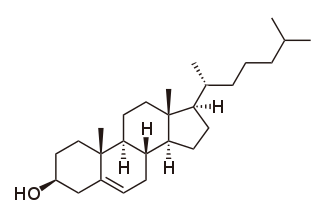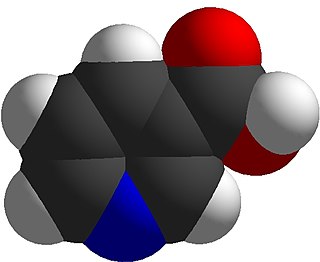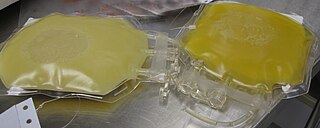Related Research Articles

Cholesterol is the principal sterol of all higher animals, distributed in body tissues, especially the brain and spinal cord, and in animal fats and oils.

Niacin, also known as nicotinic acid, is an organic compound and a vitamer of vitamin B3, an essential human nutrient. It is produced by plants and animals from the amino acid tryptophan. Niacin is obtained in the diet from a variety of whole and processed foods, with highest contents in fortified packaged foods, meat, poultry, red fish such as tuna and salmon, lesser amounts in nuts, legumes and seeds. Niacin as a dietary supplement is used to treat pellagra, a disease caused by niacin deficiency. Signs and symptoms of pellagra include skin and mouth lesions, anemia, headaches, and tiredness. Many countries mandate its addition to wheat flour or other food grains, thereby reducing the risk of pellagra.

Atherosclerosis is a pattern of the disease arteriosclerosis, characterized by development of abnormalities called lesions in walls of arteries. These lesions may lead to narrowing of the arterial walls due to buildup of atheromatous plaques. At onset there are usually no symptoms, but if they develop, symptoms generally begin around middle age. In severe cases, it can result in coronary artery disease, stroke, peripheral artery disease, or kidney disorders, depending on which body parts(s) the affected arteries are located in the body.

Statins, also known as HMG-CoA reductase inhibitors, are a class of lipid-lowering medications that reduce illness and mortality in those who are at high risk of cardiovascular disease. They are the most commonly prescribed cholesterol-lowering drugs.

The French paradox is an apparently paradoxical epidemiological observation that French people have a relatively low incidence of coronary heart disease (CHD), while having a diet relatively rich in saturated fats, in apparent contradiction to the widely held belief that the high consumption of such fats is a risk factor for CHD. The paradox is that if the thesis linking saturated fats to CHD is valid, the French ought to have a higher rate of CHD than comparable countries where the per capita consumption of such fats is lower.

Hypercholesterolemia, also called high cholesterol, is the presence of high levels of cholesterol in the blood. It is a form of hyperlipidemia, hyperlipoproteinemia, and dyslipidemia.

Atorvastatin, sold under the brand name Lipitor among others, is a statin medication used to prevent cardiovascular disease in those at high risk and to treat abnormal lipid levels. For the prevention of cardiovascular disease, statins are a first-line treatment. It is taken by mouth.

Simvastatin, sold under the brand name Zocor among others, is a statin, a type of lipid-lowering medication. It is used along with exercise, diet, and weight loss to decrease elevated lipid levels. It is also used to decrease the risk of heart problems in those at high risk. It is taken by mouth.

Rosuvastatin, sold under the brand name Crestor among others, is a statin medication, used to prevent cardiovascular disease in those at high risk and treat abnormal lipids. It is recommended to be used together with dietary changes, exercise, and weight loss. It is taken orally.

Pravastatin, sold under the brand name Pravachol among others, is a statin medication, used for preventing cardiovascular disease in those at high risk and treating abnormal lipids. It is suggested to be used together with diet changes, exercise, and weight loss. It is taken by mouth.

Ezetimibe/simvastatin is a drug combination used for the treatment of dyslipidemia. It is a combination of ezetimibe and the statin drug simvastatin.

Stanol esters is a heterogeneous group of chemical compounds known to reduce the level of low-density lipoprotein (LDL) cholesterol in blood when ingested, though to a much lesser degree than prescription drugs such as statins. The starting material is phytosterols from plants. These are first hydrogenated to give a plant stanol which is then esterified with a mixture of fatty acids also derived from plants. Plant stanol esters are found naturally occurring in small quantities in fruits, vegetables, nuts, seeds, cereals, legumes, and vegetable oils.
A polypill is a type of drug combination consisting of a single drug product in pill form and thus combines multiple medications. The prefix "poly" means "multiple", referring to the multiplicity of distinct drugs in a given "pill". In precise usage, a pill is a polypill if it contains at least 4 drugs. An occasional synonym is combopill. A polypill is commonly targets treatment or prevention of chronic conditions.
Hyperlipidemia is abnormally high levels of any or all lipids or lipoproteins in the blood. The term hyperlipidemia refers to the laboratory finding itself and is also used as an umbrella term covering any of various acquired or genetic disorders that result in that finding. Hyperlipidemia represents a subset of dyslipidemia and a superset of hypercholesterolemia. Hyperlipidemia is usually chronic and requires ongoing medication to control blood lipid levels.

Phytosterols are phytosteroids, similar to cholesterol, that serve as structural components of biological membranes of plants. They encompass plant sterols and stanols. More than 250 sterols and related compounds have been identified. Free phytosterols extracted from oils are insoluble in water, relatively insoluble in oil, and soluble in alcohols.

Fenofibrate, is an oral medication of the fibrate class used to treat abnormal blood lipid levels. It is less commonly used compared than statins because it treats a different type of cholesterol abnormality to statins. While statins have strong evidence for reducing heart disease and death, there is evidence to suggest that fenofibrate also reduces the risk of heart disease and death. However, this seems only to apply to specific populations of people with elevated triglyceride levels and reduced high-density lipoprotein (HDL) cholesterol. Its use is recommended together with dietary changes.

Red yeast rice, red rice koji, red fermented rice, red kojic rice, red koji rice, anka, or angkak, is a bright reddish purple fermented rice, which acquires its color from being cultivated with the mold Monascus purpureus. Red yeast rice is what is referred to as a "koji" in Japanese, meaning "grain or bean overgrown with a mold culture", a food preparation tradition going back to ca. 300 BC. In both the scientific and popular literature in English that draws principally on Japanese traditional use, red yeast rice is most often referred to as "red rice koji." English language articles favoring Chinese literature sources prefer the translation "red yeast rice."

Benecol is a brand of cholesterol-lowering food products owned by the Finnish company Raisio Group, which owns the trademark.

Pitavastatin is a member of the blood cholesterol lowering medication class of statins.

Aseem Malhotra is a controversial British cardiologist, health campaigner, author, and, contrary to public health consensus, an anti-mRNA vaccine activist. He contends that people should reduce sugar in their diet, adopt a low-carb and high-fat diet, and reduce their use of prescription drugs. He was the first science director of Action on Sugar in 2014, was listed as one of The Sunday Times 500 most influential people in 2016, and was twice recognized as one of the top fifty black and minority ethnic community member pioneers in the UK's National Health Service by the Health Service Journal. Malhotra is co-author of a book called The Pioppi Diet.
References
- 1 2 Davis, Matthew A.; Bynum, Julie P. W.; Sirovich, Brenda E. (1 May 2015). "Association between apple consumption and physician visits". JAMA Internal Medicine. 175 (5): 777–83. doi:10.1001/jamainternmed.2014.5466. PMC 4420713 . PMID 25822137.
- ↑ Speake J, ed. (2015). "An apple a day keeps the doctor away". Oxford Dictionary of Proverbs (6th ed.). Oxford University Press. p. 7. ISBN 978-0198734901.
- ↑ Phillips, J. P. (1866). "A Pembrokeshire proverb". Notes & Queries. 127 (s3–IX): 153.
- ↑ Ely, Margaret (24 September 2013). "History behind 'An apple a day'". Washington Post. Retrieved 5 December 2015.
- ↑ "The Pomological Show: Wrexham and Denbighshire Advertiser and Cheshire Shropshire and North Wales Register". George Bayley. 26 November 1887. p. 5. hdl:10107/4592708.
The vote of thanks having been carried unanimously, Mr Chilton responded on behalf of Miss Chilton. He also lamented the fact that large sums of money were sent out of the country for foreign fruit, and hoped that by the example and influence of that how much good would be done. He advocated the increased use of fruit, for he believed in the old saying, "An apple a day keeps the doctor away." (Laughter.) He proposed a vote of thanks to Mr Jones, the secretary, to whose untiring efforts and enthusiasm the success of the show was due. This vote of thanks having been carried, Mr Jones briefly responded, and the proceedings terminated.
- ↑ "Cover". The Country Gentleman. Vol. LXXVIII, no. 50. 13 December 1913. Retrieved 11 August 2022.
- ↑ Lambert, Madeline (6 September 1913). "Your Wife as Your Business Partner". The Country Gentleman. Vol. LXXVIII, no. 36. p. 37. Retrieved 11 August 2022.
- 1 2 Briggs, Adam D. M.; Mizdrak, Anja; Scarborough, Peter (17 December 2013). "A statin a day keeps the doctor away: comparative proverb assessment modelling study". BMJ. 347: f7267. doi:10.1136/bmj.f7267. PMC 3898162 . Retrieved 16 August 2021.
- 1 2 "Apple, raw, 100 grams". FoodData Central, US Department of Agriculture. 31 December 2018. Retrieved 16 August 2021.